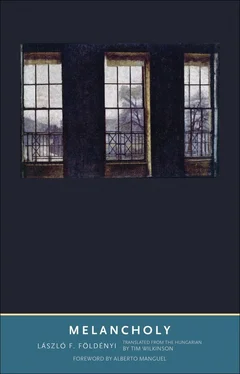The history of melancholia over the past two millennia shows that bodily condition is inseparable from the understanding of existence. We have seen that one does not simply fall ill of “something,” one’s human nature is responsible for the illness. If we really feel the need to understand the concept of melancholy or depression, then that is possible primarily on the basis of examining a given individual’s interpretation of existence and conduct of life. In departing from the strictly somatic interpretation of melancholia — or rather, the listing of certain “psychological” symptoms in a rather schoolmasterish, positivist spirit in the nineteenth century (an attitude that is still alive) — it was psychoanalysis that first attempted a more profound explanation. In comparing mourning and melancholia, Freud, making a decisive distinction between the two conditions, pointed out that the reason for mourning is known, whereas in the case of melancholia, the cause is unknown: “Melancholia is in some way related to an object-loss which is withdrawn from consciousness, in contradiction to mourning, in which there is nothing about the loss that is unconscious” (“Mourning and Melancholia,” 245). The reason for this, as Freud explains, is that for a mourning person, “only” the world has been lost, whereas for a melancholic, it is also the “ego.”
[An] attachment of the libido to a particular person had at one time existed; then, owing to a real slight or disappointment coming from this loved person the object-relationship was shattered. . The object-cathexis proved to have little power of resistance and was brought to an end. But the free libido was not displaced on to another object; it was withdrawn into the ego. . Thus the shadow of the object fell upon the ego, and the latter could henceforth be judged by a special agency as though it were an object, the forsaken object. In this way an object-loss was transformed into an ego-loss.
(249)
Since the ego as the object of libido is also an object of self-disparagement, melancholics will do all they can to get rid of the object — which leads to suicide. (Alfred Adler interprets melancholia in a similar spirit, albeit with a different conceptual apparatus: in his view, the melancholic is striving for authority and would like to gain an advantage. The melancholic’s tactic is to be in touch with very few people and try to subjugate those around him by self-abasement and tears. If that works, then the melancholia abates, but if not, then he commits suicide and thereby escapes a hopeless situation or takes his revenge on those around him.) Freud attempted to loosen the rigid interpretation of melancholia, and by emphasizing the structure and dynamics of the personality, he shifted the discourse about melancholia from its positivist dead end. At the same time, however, he left basic questions untouched, even though these necessarily follow from the dynamic concept of personality. For Freud, like the exclusively scientific spirit of medical science, examines the state of the melancholic as a state of the ego, which is confronted neutrally by the world: “In mourning it is the world which has become poor and empty; in melancholia it is the ego itself” (246), and with this rigid, unacceptable separation he prevented himself from being able to unravel the interpretation of being inherent in melancholia.
Melancholia was thus associated with certain primary desires (narcissism, sadism, suicidal tendency, anal proclivity, etc.), and the goal was merely to satisfy each of these desires; the world is a lifeless
object
that is a suitable (or unsuitable, as the case may be) place for humans to satisfy their desires. Since, according to Freud, every psychological happening is determined primarily by the instincts, in interpreting melancholia he rigidly contrasts the ego and the world of objects: everything takes place in the ego, compared with which the outside world withdraws into neutral intactness.
1
This attitude, above and beyond the distinction between an internal and an external world being just as unfortunate as that of soul and body, decidedly impedes the understanding of illness as a phenomenon: it puts an end to the dynamic unity without which one cannot speak about an interpretation of being.
The sense of loss that Freud, showing a touch of genius, chose as his starting point is not a one-sided phenomenon: the essence of loss is not the bare fact that the ego loses an object , but that something that is part of the world, but is also in my possession, modifies the place it occupied in the collectivity of existing things, and thereby it is not just its position that has changed but my existence as well. Looked at from this angle, there is just a difference in degree between the loss of a pencil and the loss of a life: if I lose my pencil, the consequences ripple onward; I am unable to write, so I am compelled to look for a new pencil; maybe I have regrets about the old one because I had long wanted a pencil just like it; I shall take more care in storing the new pencil; I take note of where I put it away; perhaps I’ll buy a pencil box; but even if I don’t, it will occur to me that I once had a pencil that was lost, and by then I shall have not only a new pencil but a memory, too, etc. All that can be enacted in a matter of moments or might last an hour or two, but in no way more than a day or two in the case of a pencil. It could be that I do not think of any of these things: still, the loss of the pencil “in itself” brings about a change in my world; it is not as though this had ever become fixed, but the loss draws attention to the incessant changeability of existence. Usually, one notices a loss with annoyance; that annoyance, however, is proof that it is not about the lost item slipping back into a neutral, objective world, but about the intimate relationship (which of course had been seemingly neutral and external until the loss happened) between objects and people, which is transformed. I am annoyed because with the loss of the pencil a piece of my property, in the deeper sense of the word, a piece of me, however unnoticeable, is gone. Loss is not an analogue of arithmetical subtraction, but a human situation. In the loss and my ensuing annoyance there is a warning: something was unavoidably injured. What that was is normally not noticeable; we reach too quickly for a new pencil for us to realize what has happened. We can’t say that the pencil has ceased to exist (it may be under the bed), nor did I die over the loss. All the same, something got muddled up just enough for me to suppress a quiet curse, with which, as in the case of all cursing, I conceal that this petty inconvenience is a harbinger of that certain, final, big inconvenience.
This is one of the most typical manifestations of melancholia, but it is also in melancholia that the sense of loss manifests its true reality. For while mundane practice teaches people not to get stuck for too long on losses that befall them (this relates not only to pencils but, as Claudius advises Hamlet, to the death of loved ones as well), and the loss is interpreted practically (including their own death, about which it is “best not to think”), the melancholic is incapable of that; an injury is discerned in the loss, injustice in the injury, and death, the chief injustice, in the injustice. The lost item is not an object but a part of myself, and the essence of the sense of loss — contrary to the Freudian notion — is precisely that there is an intimate relationship between ego and object. The more profoundly I experience the loss, the more irreplaceable the object, because all the more do I feel I have lost my footing. Among the reasons the melancholic is melancholic is because he sees the personal death awaiting him in the slightest loss of an object. 2The symptoms observed in melancholics can be explained by the profound (mortal) experience of loss: the not primarily psychological but corporeal heaviness (vital depression); psychomotor inhibition, which can lead to total inhibition of action, stuporous melancholia; along with the related cognitive inhibition. Only the melancholic is capable of experiencing the sense of death that may result from loss: the physical symptoms signal that it is not just a matter of thinking death over. (In the view of psychosomatically based cancer researchers, it is precisely loss-induced depression that can promote the development of certain types of cancer.) The nihilistic ideas that melancholics report (everyone is dead, everything has been destroyed, all is bleak, etc.) are related to nihilistic sensations of the body (they feel that their brains have been replaced by feces, their veins have dried up, there are worms under their skin, their skin is too tight for their bodies, etc.). A sense of loss can also explain the frequent wavering uncertainty of melancholics when it comes to making decisions (in truth, it is not that they are unable to decide but that they have lost the ability to judge whether it is worth deciding at all), and the accompanying lack of ability to act.
Читать дальше












